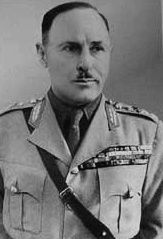Konstantinos Ventiris
| Konstantinos Ventiris | |
|---|---|

Ventiris during the Greek Civil War
|
|
| Native name | Κωνσταντίνος Βεντήρης |
| Born | 1892 Kalamata, Greece |
| Died | 1960 (aged 67–68) Athens, Greece |
| Allegiance |
|
| Service/branch | Hellenic Army |
| Years of service | 1910–1935, 1943–1951 |
| Rank |
|
| Commands held | Chief of the Hellenic Army General Staff |
| Wars | Balkan Wars, Macedonian Front, Greco-Turkish War of 1919–1922, Greek Civil War |
| Awards | Commander's Cross of the Cross of Valour |
Konstantinos Ventiris (Greek: Κωνσταντίνος Βεντήρης, 1892–1960) was a Greek Army officer who rose to the rank of lieutenant general. He served twice as Chief of the Hellenic Army General Staff and was one of the senior government commanders during the Greek Civil War. He is also one of the few recipients the country's highest wartime decoration, the Commander's Cross of the Cross of Valour.
He was born in Kalamata in 1892, the second of seven children. His brothers became journalists, and the eldest, Georgios, was an associate of the Liberal leader Eleftherios Venizelos. After completing his school studies, he joined the Hellenic Army as a volunteer on 1 April 1910, and fought in the Balkan Wars of 1912–1913. He entered the NCO Academy and graduated in March 1914 as an Infantry Second Lieutenant. During World War I, he served in the Macedonian Front, being promoted to lieutenant in 1917 and acting as a company commander during the 1918 Allied offensive. In 1919 he was promoted to major, and fought as battalion commander and CO of the 23rd Regiment in the Asia Minor Campaign of 1919–1922.
In late 1922 he was appointed as chief of staff of the 7th Infantry Division, and was promoted to lieutenant colonel in 1923. He then served as CO of the 1st and 41st Infantry Regiments. In 1930 he was promoted to full colonel, serving as military attaché to Yugoslavia and Czechoslovakia, Director of the General Staff's Second Bureau (Intelligence) and as Deputy Commandant of the War College. As a confirmed Venizelist and Republican, he was dismissed from the army in the aftermath of the failed Republican March 1935 coup attempt.
...
Wikipedia
